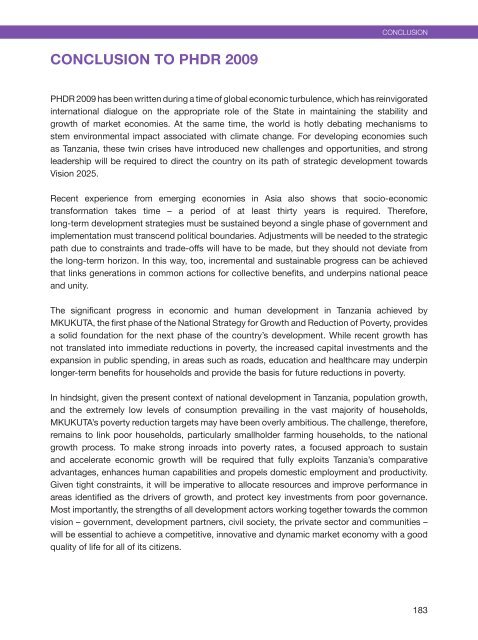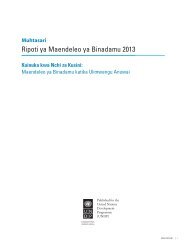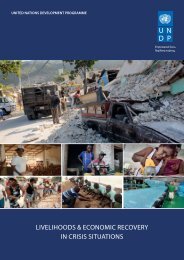Poverty and Human Development Report 2009 - UNDP in Tanzania
Poverty and Human Development Report 2009 - UNDP in Tanzania
Poverty and Human Development Report 2009 - UNDP in Tanzania
You also want an ePaper? Increase the reach of your titles
YUMPU automatically turns print PDFs into web optimized ePapers that Google loves.
ConCluSIon to PHDR <strong>2009</strong><br />
CONCLUSION<br />
PHDR <strong>2009</strong> has been written dur<strong>in</strong>g a time of global economic turbulence, which has re<strong>in</strong>vigorated<br />
<strong>in</strong>ternational dialogue on the appropriate role of the State <strong>in</strong> ma<strong>in</strong>ta<strong>in</strong><strong>in</strong>g the stability <strong>and</strong><br />
growth of market economies. At the same time, the world is hotly debat<strong>in</strong>g mechanisms to<br />
stem environmental impact associated with climate change. For develop<strong>in</strong>g economies such<br />
as <strong>Tanzania</strong>, these tw<strong>in</strong> crises have <strong>in</strong>troduced new challenges <strong>and</strong> opportunities, <strong>and</strong> strong<br />
leadership will be required to direct the country on its path of strategic development towards<br />
Vision 2025.<br />
Recent experience from emerg<strong>in</strong>g economies <strong>in</strong> Asia also shows that socio-economic<br />
transformation takes time – a period of at least thirty years is required. Therefore,<br />
long-term development strategies must be susta<strong>in</strong>ed beyond a s<strong>in</strong>gle phase of government <strong>and</strong><br />
implementation must transcend political boundaries. Adjustments will be needed to the strategic<br />
path due to constra<strong>in</strong>ts <strong>and</strong> trade-offs will have to be made, but they should not deviate from<br />
the long-term horizon. In this way, too, <strong>in</strong>cremental <strong>and</strong> susta<strong>in</strong>able progress can be achieved<br />
that l<strong>in</strong>ks generations <strong>in</strong> common actions for collective benefits, <strong>and</strong> underp<strong>in</strong>s national peace<br />
<strong>and</strong> unity.<br />
The significant progress <strong>in</strong> economic <strong>and</strong> human development <strong>in</strong> <strong>Tanzania</strong> achieved by<br />
MKUKUTA, the first phase of the National Strategy for Growth <strong>and</strong> Reduction of <strong>Poverty</strong>, provides<br />
a solid foundation for the next phase of the country’s development. While recent growth has<br />
not translated <strong>in</strong>to immediate reductions <strong>in</strong> poverty, the <strong>in</strong>creased capital <strong>in</strong>vestments <strong>and</strong> the<br />
expansion <strong>in</strong> public spend<strong>in</strong>g, <strong>in</strong> areas such as roads, education <strong>and</strong> healthcare may underp<strong>in</strong><br />
longer-term benefits for households <strong>and</strong> provide the basis for future reductions <strong>in</strong> poverty.<br />
In h<strong>in</strong>dsight, given the present context of national development <strong>in</strong> <strong>Tanzania</strong>, population growth,<br />
<strong>and</strong> the extremely low levels of consumption prevail<strong>in</strong>g <strong>in</strong> the vast majority of households,<br />
MKUKUTA’s poverty reduction targets may have been overly ambitious. The challenge, therefore,<br />
rema<strong>in</strong>s to l<strong>in</strong>k poor households, particularly smallholder farm<strong>in</strong>g households, to the national<br />
growth process. To make strong <strong>in</strong>roads <strong>in</strong>to poverty rates, a focused approach to susta<strong>in</strong><br />
<strong>and</strong> accelerate economic growth will be required that fully exploits <strong>Tanzania</strong>’s comparative<br />
advantages, enhances human capabilities <strong>and</strong> propels domestic employment <strong>and</strong> productivity.<br />
Given tight constra<strong>in</strong>ts, it will be imperative to allocate resources <strong>and</strong> improve performance <strong>in</strong><br />
areas identified as the drivers of growth, <strong>and</strong> protect key <strong>in</strong>vestments from poor governance.<br />
Most importantly, the strengths of all development actors work<strong>in</strong>g together towards the common<br />
vision – government, development partners, civil society, the private sector <strong>and</strong> communities –<br />
will be essential to achieve a competitive, <strong>in</strong>novative <strong>and</strong> dynamic market economy with a good<br />
quality of life for all of its citizens.<br />
183





